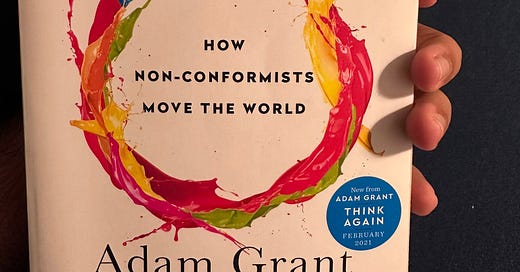Last week I finished reading this fantastic book by Adam Grant titled Originals. Grant explores what it means to be truly original and how we can embrace unconventional thinking to move the needle. My notes and key take aways from the book -
Procrastination can fuel creativity: Instead of rushing through tasks, allowing yourself to procrastinate (within reason) gives ideas time to incubate. This waiting period often leads to more original and refined ideas.
The myth of first-mover advantage: Being the first to market doesn’t guarantee success. It’s often those who wait, learn from others’ mistakes, and refine existing ideas who ultimately win. Being second can sometimes be better than being first.
Inspiration starts with “Why”: To inspire people and get them on board with your ideas, start by clearly communicating why you’re doing something. Once people understand your vision and purpose, they are more likely to follow and support you.
Balancing novelty with familiarity: The most successful ideas aren’t purely new; they combine novelty with a sense of familiarity. People are more likely to accept something new if it has elements they can relate to or already understand.
Frenemies drain energy, focus on enemies: Frenemies—those who are both competitive and friendly—are emotionally draining and not the best focus of your energy. Instead, try to convince outright enemies. If they come around to your side, it proves the strength of your idea.
Lateborns tend to be more original: Younger siblings, or “lateborns,” are often more willing to take risks and break the mold, compared to older siblings who tend to follow more conventional, risk-averse paths. Growing up with more freedom can lead to more rebellious, creative thinking.
Mentorship fosters originality: Mentors play a crucial role by encouraging original thinking and providing guidance through reason rather than rules. Raising children (and even mentoring employees) by giving them the rationale behind decisions fosters independent, creative thought.
Avoiding groupthink: In group settings, people often agree with each other to avoid conflict, which can kill innovation. Creating environments where people feel safe to express their opinions, disagree, and have open conversations leads to better, more original ideas.
Encouraging open discussions at work: In teams, it’s important to actively promote a culture where people are comfortable sharing their ideas and challenging the status quo. Encouraging employees to speak up helps foster an atmosphere of creativity and originality.
The power of thoughtful disagreements: Thoughtful debate is crucial to the development of new ideas. Grant suggests that you should argue like you’re right but listen like you’re wrong. This open-minded approach helps generate fresh perspectives and pushes ideas further.
Curated Picks for the Week
My Unapologetically Unfiltered Unprecedented Conversation with Sajad Lone
Juan Carlos Izpisua Belmonte, Altos Labs | All In Summit 2024





Too good this one